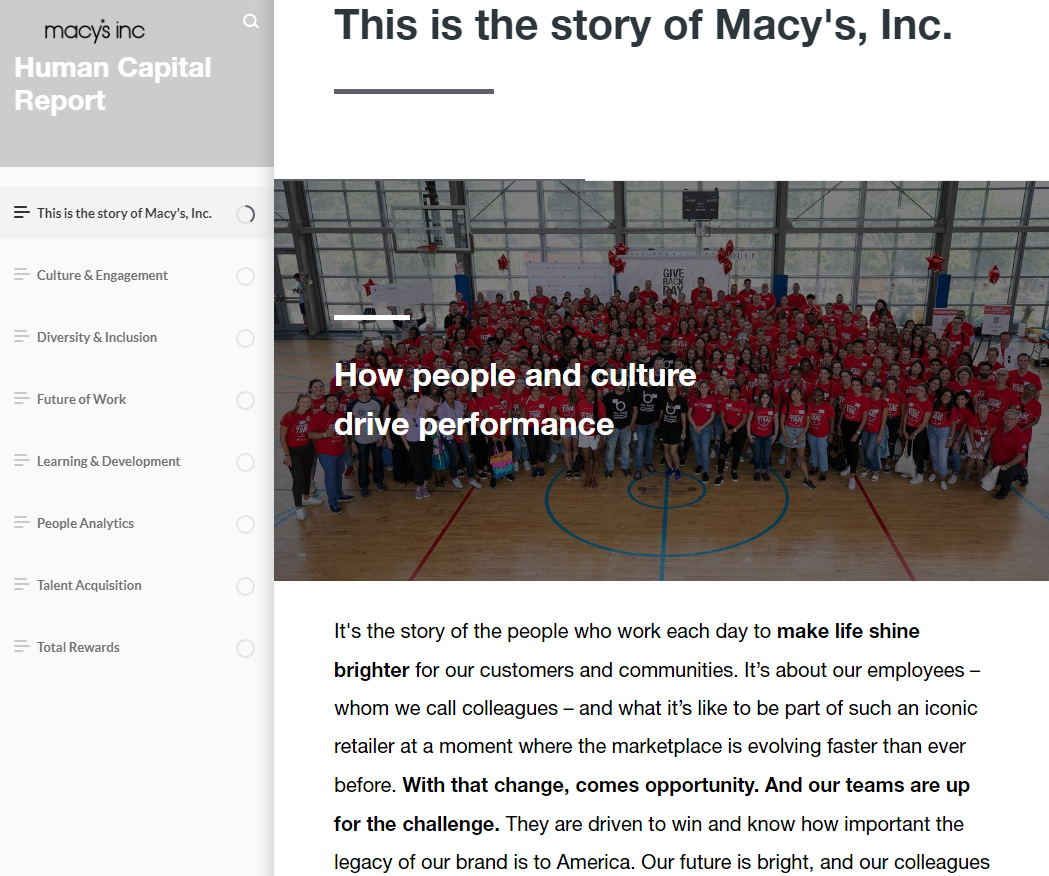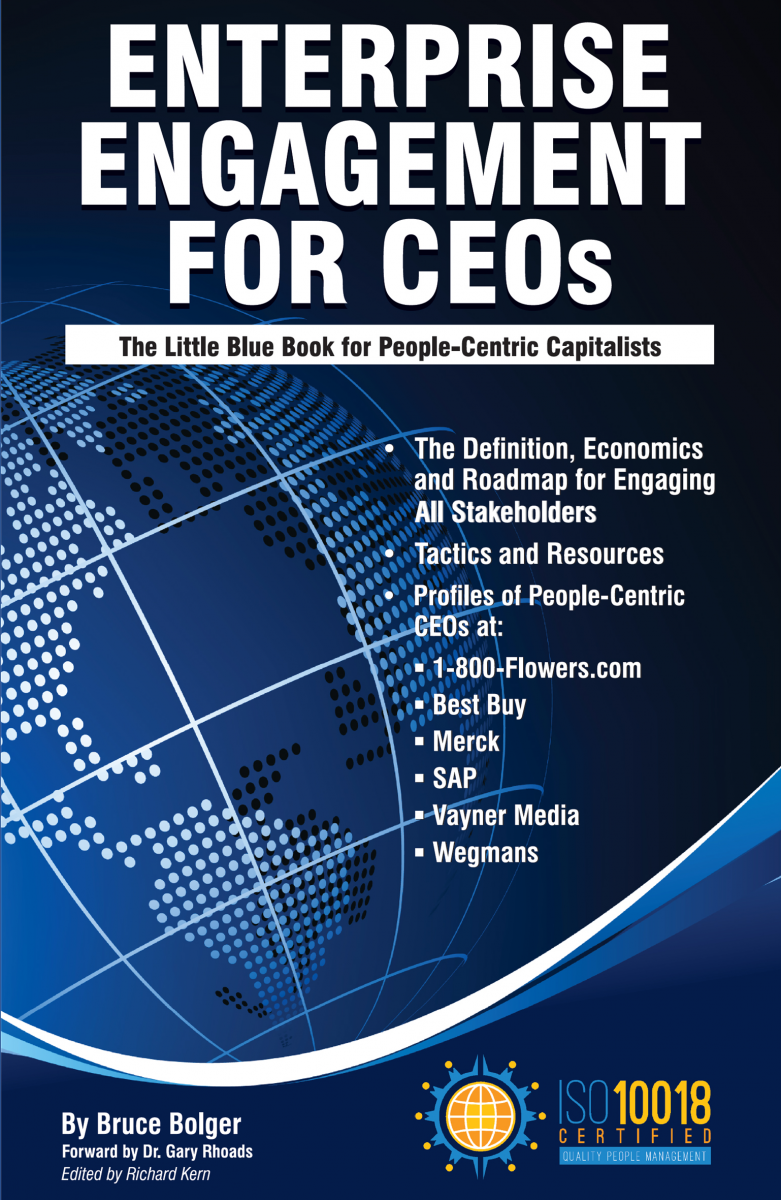.png) Click here for the report and to access the PDF of the report referenced in the score sheet below.
Click here for the report and to access the PDF of the report referenced in the score sheet below. Micron Technology 2020 Corporate Sustainability Report—EEA Score: 28
| Category | Methodologies | Metrics | |
|---|---|---|---|
|
1. Leadership
|
Yes |
The report provides a clear vision for the organization; largely links activities to organizational vision and addresses current risks. See page 59. Score: 2 |
It provides metrics in conformance with both GRI and SASB.
See page 69.
Score: 2 |
|
2. Compliance
|
Yes |
The report provides extensive information addressing compliance issues.
Score: 2
|
Uses GRI and SASB disclosures.
See page 81.
Score: 2
|
|
3. Costs
|
No |
There is no information related to human capital costs.
Score: 0
|
No specific metrics related to costs.
Score: 0
|
|
4. Diversity Inclusion
|
Yes |
Micron provides extensive information on its DEI practices as it relates to employees and the supply chain. See page 62 for employee diversity and page 56 for supplier diversity.
Score: 2
|
Basic diversity metrics are provided by ethnicity, gender, and region.
See page 63.
Score: 1
|
|
5. Occupational Health and Safety
|
Yes |
Micron provides details on its safety and wellness methodologies. See page 65.
Score: 2
|
Some basic metrics are provided on accident rates. See page 65 and 66.
Score: 1
|
|
6. Organizational Culture
|
Yes |
The report defines the culture and the methods used to support it, with employee engagement information also provided.
Score: 2
|
Some basic metrics are provided on employee engagement.
See page 61.
Score: 1
|
|
7. Productivity
|
No |
The report provides no analytics or references as to how the company manages people costs or measures the results of people management activities.
Score: 0
|
There are no metrics Human Capital ROI or Human Capital Value Add, other or key metrics.
Score: 0
|
|
8. Recruitment, Mobility and Turnover Recruitment, etc.
|
No |
The report providers little information on recruitment.
Score: 0
|
No metrics are provided on mobility and turnover.
Score: 0
|
|
9. Employee Bench Strength
|
No |
The company provides information on its training and development activities for talent.
Score: 1
|
No metrics are provided relative to bench strength.
Score: 0
|
|
10. Skills and Capabilities Skills, cont.
|
Yes |
The report provides details on its variety of professional and development efforts and objectives. See page 69.
Score: 2
|
Basic information is provided on training hours.
See pages 69 and 70.
Score: 1
|
|
11. Workforce Availability
|
No |
The report does not provide information on this issue.
Score: 0
|
No metrics are provided.
Score: 0
|
|
12. Customer Engagement
|
Yes |
The report addresses customer issues in its Products and Services section but does not provide metrics.
Score: 1
|
No metrics are provided.
Score: 0
|
|
13. Supply Chain Engagement
|
Yes |
The report provides extensive information on supply chain management practices. See page 42 and page 56 for supplier diversity. Score: 2 |
Some information is provided on supply chain diversity and inclusion efforts and metrics.
See page 41.
Score: 1
|
| 14. Community Engagement | Yes |
The report provides extensive information on community engagement activities aligned with organizational purpose and needs.
See page 73.
Score: 2
|
The report provides metrics on expenditures on different types of charitable and community support programs.
Score: 1
|
 Click here to access the Macy’s Human Capital Report.
Click here to access the Macy’s Human Capital Report.| Category | Methodologies | Metrics | |
|---|---|---|---|
| 1. Leadership | Yes |
The report provides details on the Macy’s culture, values, and the methods by which it develops talent. It does not specify who is specifically accountable. The report addresses issues related to Covid but makes no mention of its store closings and layoffs.
Score: 1
|
Measures include results of employee engagement surveys.
Score: 1
|
| 2. Compliance | No |
No information is provided.
Score: 0
|
Score: 0 |
| 3. Costs | No |
No information is provided.
Score: 0
|
Score: 0 |
| 4. Diversity Inclusion | Yes |
The report includes information on the methods by which it includes DEI into stakeholder engagement processes, including employees, customers, supply chain, and communities.
Click here for information.
Macy’s also publishes a separate report on supplier diversity with detailed information on practices and statistics.
Click here for the report.
Score: 2
|
The report provides basic information on workforce composition based on SASB standards. The supplier diversity report provides more extensive information.
Score: 1
|
| 5. Occupational Health and Safety | Yes |
Provides detailed information on safety processes for customers and employees.
Click here for information.
Score: 1
|
No clear metrics are provided on outcomes.
Score: 0
|
| 6. Organizational Culture | Yes |
The report provides extensive information on the organization’s culture and values. It provides information on how it connects culture and values to performance. Provides measures on employee engagement based on SASB framework.
Click here for information.
Score: 2
|
Some basic metrics are provided related to engagement in the organizational culture.
Score: 1
|
| 7. Productivity | No |
The report contains no information on productivity or related measures of workforce efficiency.
Score: 0
|
No metrics provided.
Score: 0
|
| 8. Recruitment, Mobility and Turnover Recruitment, etc. | No |
The report provides details on recruitment and total rewards strategy.
Score: 1
|
No metrics provided.
Score: 0
|
| 9. Employee Bench Strength | Yes |
The report provides methodologies related to workforce structure and design.
Score: 1
|
No metrics provided.
Score: 0
|
| 10. Skills and Capabilities Skills, cont. | Yes |
The report provides information on its learning and development programs at all levels of the organization.
Click here for more information.
Score: 2
|
Some metrics provided in workforce engagement in these programs.
Score: 1
|
| 11. Workforce Availability | Yes |
The report provides basic information on skills and leadership training.
Score: 1
|
No metrics.
Score: 0
|
| 12. Customer Engagement | No |
There is no substantive information on customer engagement.
Score: 0
|
No metrics provided.
Score: 0
|
| 13. Supply Chain Engagement | No |
A separate report provides details on its supply chain management principles, including DEI.
Click here for information on overall supplier policies.
Click here for information on supplier diversity.
Score: 2
|
Macy’s provides basic information on supply chain compliance and more detailed information on supplier diversity and economic impact.
Score: 1
|
| 14. Community Engagement | Yes |
In a separate report, Macy’s provides details on its community development efforts.
Click here for information.
Score: 2
|
Macy’s provides details on the value of its contributions and time and money donated.
Score: 2
|


Online Overview:
10-minute short course: click here for a 10-minute introduction to Enterprise Engagement and ISO standards from the Coggno.com learning platform.
Services:
• The Engagement Agency at EngagementAgency.net, offering: complete support services for employers, solution providers, and technology firms seeking to profit from formal engagement practices for themselves or their clients, including Brand and Capability audits for solution providers to make sure their products and services are up to date.
• C-Suite Advisory Service—Education of boards, investors, and C-suite executives on the economics, framework, and implementation processes of Enterprise Engagement.
• Speakers Bureau—Select the right speaker on any aspect of engagement for your next event.
• Mergers and Acquisitions. The Engagement Agency’s Mergers and Acquisition group is aware of multiple companies seeking to purchase firms in the engagement field. Contact Michael Mazer in confidence if your company is potentially for sale at 303-320-3777.
Enterprise Engagement Benchmark Tools: The Enterprise Engagement Alliance offers three tools to help organizations profit from Engagement. Click here to access the tools.
• ROI of Engagement Calculator. Use this tool to determine the potential return-on-investment of an engagement strategy.
• EE Benchmark Indicator. Confidentially benchmark your organization’s Enterprise Engagement practices against organizations and best practices.
• Compare Your Company’s Level of Engagement. Quickly compare your organization’s level of engagement to those of others based on the same criteria as the EEA’s Engaged Company Stock Index.
• Gauge Your Personal Level of Engagement. This survey, donated by Horsepower, enables individuals to gauge their own personal levels of engagement.
For more information, contact Bruce Bolger at Bolger@TheEEA.org, 914-591-7600, ext. 230.
 ESM News Alert for the latest news. Subscribe here.
ESM News Alert for the latest news. Subscribe here.
